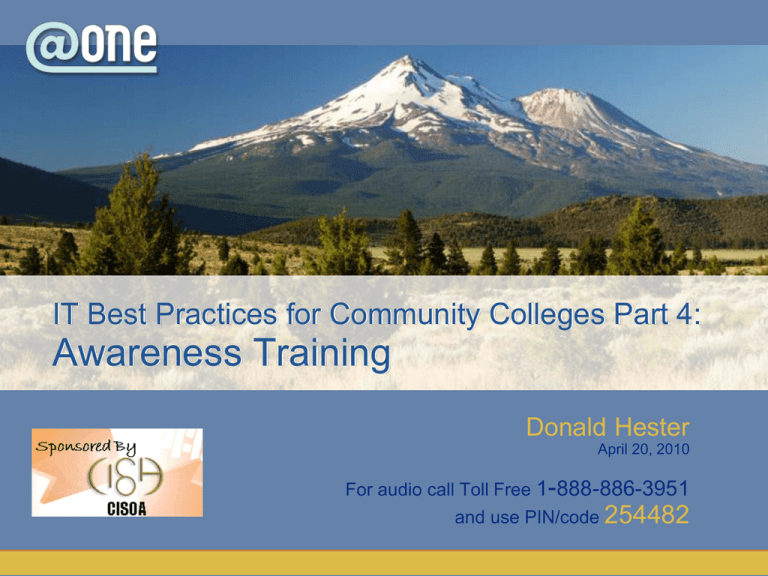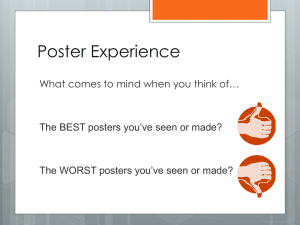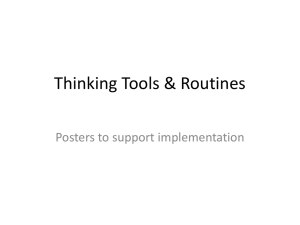Presentation Slides
advertisement

IT Best Practices for Community Colleges Part 4: Awareness Training Donald Hester April 20, 2010 For audio call Toll Free 1-888-886-3951 and use PIN/code 254482 Housekeeping • Maximize your CCC Confer window. • Phone audio will be in presenter-only mode. • Ask questions and make comments using the chat window. Adjusting Audio 1) If you’re listening on your computer, adjust your volume using the speaker slider. 2) If you’re listening over the phone, click on phone headset. Do not listen on both computer and phone. Saving Files & Open/close Captions 1. Save chat window with floppy disc icon 2. Open/close captioning window with CC icon Emoticons and Polling 1) Raise hand and Emoticons 2) Polling options IT Best Practices for Community Colleges Part 4: Awareness Training Donald Hester What is Security Awareness? Awareness is not training The purpose of awareness presentations is simply to focus attention on security Awareness presentations are intended to allow individuals to recognize IT security concerns and respond accordingly Security awareness efforts are designed to change behavior or reinforce good security practices 7 How does Training differ from Awareness In awareness activities, the learner is the recipient of information the learner in a training environment has a more active role Awareness relies on reaching broad audiences with attractive packaging techniques Training is more formal, having a goal of building knowledge and skills 8 9 Cycle of Security Training Awareness Program Establish a policy Assign responsibility (CIO, Director) Needs assessment Develop Awareness and Training Materials Implementation of the program Update and monitor program Program 11 Needs Assessment What awareness, training and/or education are needed? What is currently being done to meet these needs? How well is it working? Which needs are most critical? NIST SP 800-50 has a Sample Needs Assessment and Questionnarie 12 Needs Assessment 13 Establish Priorities Availability of Material/Resources • In house or outsourced Role and Organizational Impact • How ill this help people do their job • How will this help us reach our overall goals State of Current Compliance • How informed are staff and students about security and privacy practices Critical Project Dependencies • Funding 14 Materials “What behavior do we want to reinforce?” (awareness) “What skill or skills do we want the audience to learn and apply?” (training) Watch out for the “we’re here because we have to be here” attitude An awareness and training program can be effective, if the material is interesting and current 15 Practice One way to get users involved and invested in the training is to make the training cover topics they are interested in For example a class on “FaceBook” or “MySpace” Users are interested in what they are interested in, use it to your advantage 16 Possible Topics •Password usage and management •Unknown e-mail attachments •Policy •Personal use and gain issues •System and application patching •Personal systems at work 17 •Web usage •Data backup and storage •Social engineering •Inventory and property transfer •Portable device issues •Laptop security •Physical security •Software licensing •Use acknowledgements Campaign 18 Use marketing skills Get students involved Assignment for class Branding Use Social Media Use Posters Use Email reminders Leverage Safety Awareness Mascots Alerts Use multiple vectors 19 Website notices RSS Feeds Posters Emails Announcements Logon banners Seminars and classes Games and contests Awards Use real life examples of incidents Use incidents as an opportunity to teach “what not to do” The news has stories everyday you can use The best stories are often those “closest to home” Initial User Training 20 Upon hire and annually thereafter Must complete before access is granted Serves as notification (legal) What do they need to know to do their job A basic IT security course – often online Reminders http://blogs.technet.com/askds/archive/2008/02/08/deploying-legal-notices-to-domain-computers-using-group-policy.aspx Some people question the usefulness of these warnings However it serves at the least as a subconscious reminder Legal questions arise 21 Sample Posters (Government) 22 Buy Posters 23 Short and to the point 24 NIST Posters 25 26 Maintenance of the Program Continuous improvement should always be the theme for security awareness and training initiatives, as this is one area where “you can never do enough.” 27 Input for Updates 28 Maintain the Program Frequency that each target audience should be exposed to material Documentation, feedback, and evidence of learning for each aspect of the program Evaluation and update of material for each aspect of the program Is this working??? 29 Goal of Training Training is separate from awareness but there overlapping areas The goal of training is to produce relevant and needed skills and competencies It is crucial that the needs assessment identify those individuals with significant IT security responsibilities, assess their functions, and identify their training needs 30 Training Training plan should identify an audience, or several audiences, that should receive training tailored to address their IT security responsibilities Each user may need specific training for their job • Network admins may need Windows or • 31 Cisco security training Admissions may need special training for handling student records Example of Training This course falls under training Focus on job roll skills and competencies • Specifically tailored for managers and • decision makers Designed to help them (You) with their job function Online delivery (CCCConfer) Live instructor and recorded archive 32 KPI (Key Performance Indicators) Sufficient funding to implement the agreed-upon strategy Appropriate organizational placement to enable those with key responsibilities to effectively implement the strategy Support for broad distribution (e.g., web, e-mail, TV) and posting of security awareness items Executive/senior level messages to staff regarding security Use of metrics (e.g., to indicate a decline in security incidents or violations) Managers do not use their status in the organization to avoid security controls that are consistently adhered to by the rank and file Level of attendance at mandatory security forums/briefings Recognition of security contributions (e.g., awards, contests) Motivation demonstrated by those playing key roles in managing/coordinating the security program 33 Resources Consider Partnerships • Other community colleges have the same needs – work together Books • Managing an Information Security and Privacy Awareness and Training Program ISBN 978-1439815458 Standards and Guidance • NIST SP 800-50 Building an IT Security Awareness and Training Program Posters • Monthly subscriptions • http://www.securityawareness.com/postersub.htm New York http://www.cscic.state.ny.us/cscorner/events/2008/index.cfm Social Media Example • http://www.facebook.com/group.php?gid=245570977486 34 Q&A Donald E. Hester CISSP, CISA, CAP, MCT, MCITP, MCTS, MCSE Security, Security+ Maze & Associates @One / San Diego City College www.LearnSecurity.org http://www.linkedin.com/in/donaldehester http://www.facebook.com/group.php?gid=245570977486 Evaluation Survey Link Help us improve our seminars by filing out a short online evaluation survey at: http://www.surveymonkey.com/s/10SpIT4 IT Best Practices for Community Colleges Part 4: Awareness Training Thanks for attending For upcoming events and links to recently archived seminars, check the @ONE Web site at: http://onefortraining.org/











